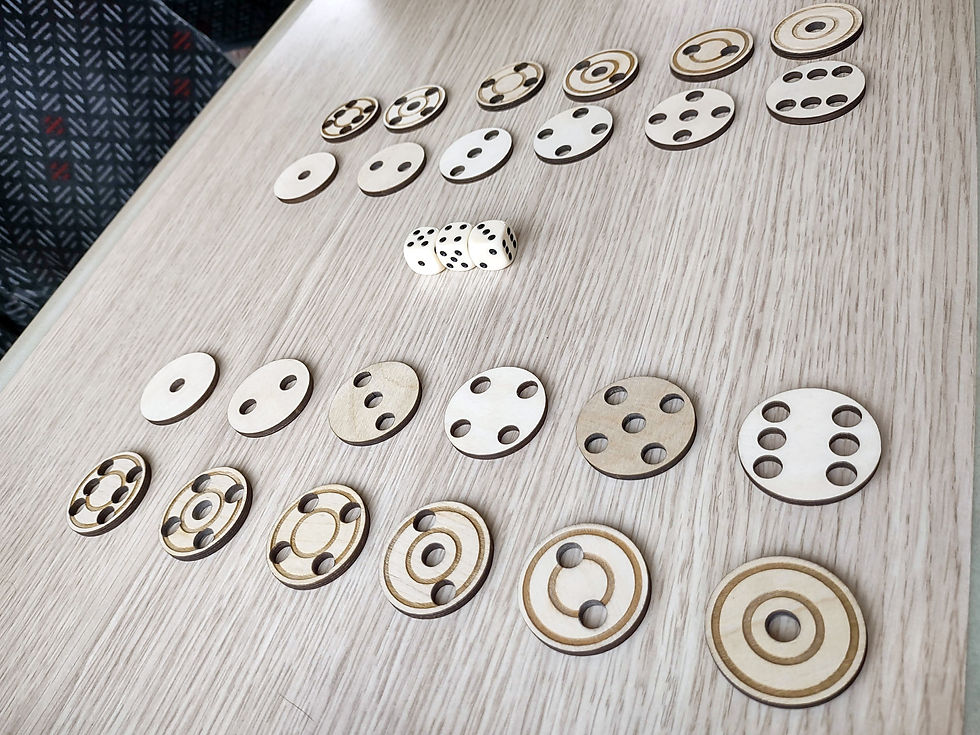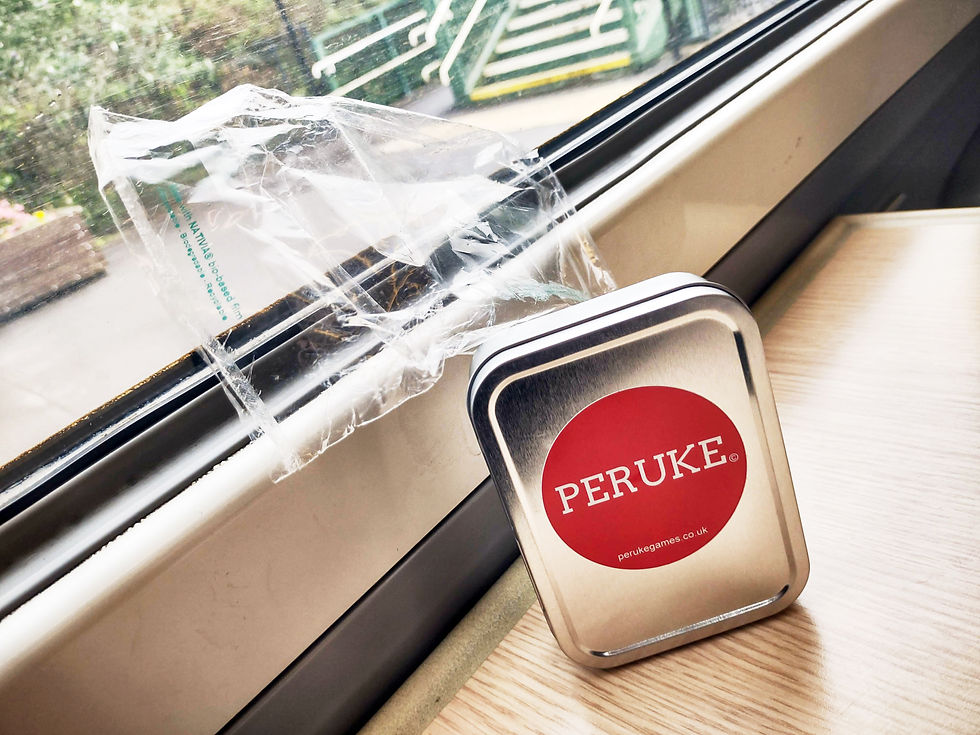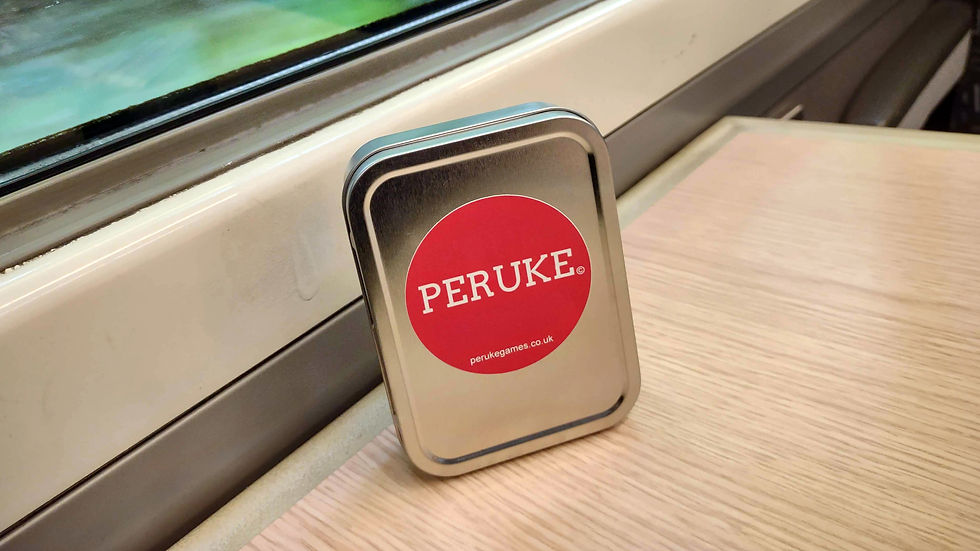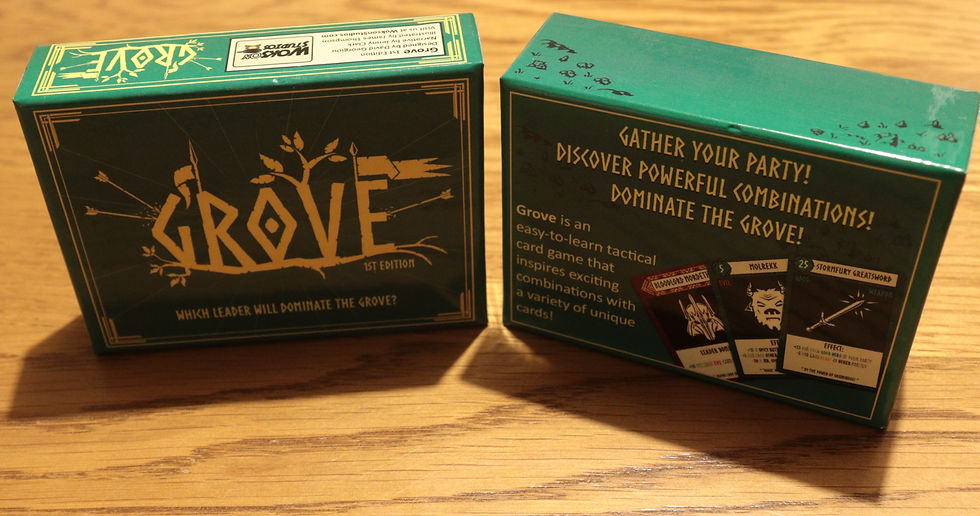Peruke: a nearly-perfect abstract game of discs, dice, and destiny
- Gregor Smith
- Mar 16, 2024
- 3 min read
"The sales guy assured us that there's no way you would already have a copy of this," my in-laws told me this Christmas. It's an interesting sales tactic, and one that clearly won out, but on this occasion he wasn't correct. However, receiving a copy of Peruke for Christmas did remind me that I played my review copy the previous summer, and needed to finish the write-up. So here it is.

Twenty four wooden discs, three dice, and an instruction booklet; all in a tin a little larger than a matchbox. That's all there is to Peruke, and that's a good thing. It makes the game incredibly portable, and you can start a game anywhere. To prove that point, all the photos you'll see are from a game I played on a class 158 train between Swansea and Cardiff.
Your simple goal in Peruke, from Peruke Games (www.perukegames.co.uk), is to steal all your opponents' discs before they can steal yours. This is done by rolling three dice on your turn, and if the number on your dice matches an opponent's vulnerable disc, you can steal it.
There are occasions you might not want to steal someone's discs, though. If you still have a disc of that number yourself, you can flip it over from its vulnerable side (with two circle ridges carved into it) to its invulnerable side. For an opponent to steal an invulnerable disc, they'll need to roll that number twice: once to flip it back to vulnerable, and again to actually steal the disc.
When calculating your score at the end of the round, it's not the number of discs you've stolen that matters, but the value of the numbers on those discs. It adds a healthy balance of strategy to what would otherwise be a purely luck-based game: when you roll higher numbers, do you choose to protect your high-value discs? or do you go for the steal on discs that are worth more to you? When you roll lower numbers, is it worth protecting your lower-value discs when you could be using that roll to earn some quick and easy points?
As the number of unclaimed discs is whittled down, of course, this strategy does give way to plain old dice luck, as there's a chance you can roll a value that has no discs left. If anything, that only makes the gameplay faster and increases the tension as you desperately try to cling on to your last discs, while waiting to see who will be eliminated first and trigger the end of the round.

The gameplay of Peruke is fast-paced, in which players will find themselves constantly being torn between small decisions that could be the difference between victory and defeat, but crucially, it's simple to understand.
That simplicity extends to the manufacture of the game too - these are three simple dice and unvarnished wooden discs (although you could probably paint the discs, if you wanted to add a personal touch), which stack so neatly into their tin. It's the game where I get the most satisfaction from just opening the box. It makes for a sustainable game too - no unnecessary plastic inserts or custom dice here.

That sustainability is somewhat undermined by the fact the simple tin, adorned by nothing other than a sticker, and its sophisticated wooden discs, is shipped in a thin, unrecyclable plastic bag. I can understand the idea of this bag stopping the tin from receiving scratches in transit, but ultimately the tin exists to protect the pieces inside and aid portability. If I'm going to throw the tin in my rucksack for a train journey anyway, what's the point? This could have been a totally plastic-free game, and that feels like a missed opportunity.
I should also mention the version of Peruke that I was gifted, which is a 'Black Label Edition', is different from the basic copy I was sent for review (which is fine, I'm a beggar not a chooser). This swaps out one of the white dice for a red die and allows players to choose whether they want to add the value of that red die to one of the white dice to unlock a higher number. Using this will make an already quick game run even faster, so it's definitely an interesting addition to consider.

Peruke is not the game you are taking to your big games night, and that is its biggest selling point. You will play it more than any big box game you own. It is the game you are using to pass the time on a train journey, the game you are playing in between meetings, the game that's filling in while you're waiting for other people to show up to your social occasion of choice; and that's what makes it a nearly perfect abstract game. Shame about the pointless plastic bag though.
Grgr













Ohh, gaming! I’ve been playing at Villento, and those 20 free spins are a solid way to get started. It's a low-risk way to see if the site is your vibe. You can read more about it here: https://casinoonlineca.ca/blog/villento-20-free-spins/ . They’ve got a pretty good selection of games, so you’ll find something fun.
Ohh, games are always fun, but you want one that’s legit, right? Memo Casino’s got it all—6,000+ games and some great bonuses at https://memo-casinouk.com/ New users get up to 450 GBP and 250 Free Spins. If you’re looking to try something new, this is definitely the spot!